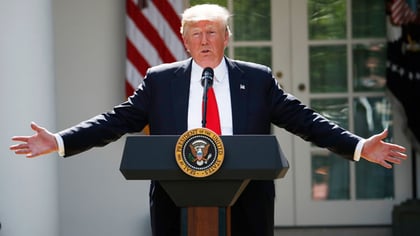The number one worry among market strategists and economists after Donald Trump won the U.S. presidential election was protectionism. He campaigned on imposing a 45% tax on imports from China and a 35% tax on imports from Mexico as well as dropping out of NAFTA (which he is still negotiating) and withdrawing from the Trans-Pacific Partnership (which he did).
Now those protectionist worries have met reality with Trump’s announcement that his administration will impose a 25% tariff on imported steel and 10% tariff on imported aluminum, and the stock market, which had been recovering from a very volatile February, is sinking once again. The Dow Jones industrial average fell close to 400 points during morning trading on Friday before recovering more than half the loss in late afternoon trading.
“I am not one to overreact — ‘keep calm and carry on’ is my default answer,” writes Brad McMillan, chief investment officer at Commonwealth Financial Network, in his latest market commentary. “But this really could be something new and worse than what we have seen so far.”
David Kotok, co-founder and chief investment officer of Cumberland Advisors, took the unusual, and maybe unprecedented, move to invite the readers of his regular commentaries “to research the following words: protectionism, tariffs, quotas, trade barriers, Smoot, Hawley, history, learning from history, lessons of the past,” then forward a summary of that research to the White House, their senators and House representatives, their Federal Reserve district bank and the Board of Governors of the Fed, which “now has to add protectionism effects to its forecast path.”
Kotok explains: “We do know from history that protectionism results in higher inflation and slower growth over time. It doesn’t happen all at once … what we do know is that this Trump protectionist policy can lead only to trouble if it is pursued.”
That is the big question. Trump is well known for saying one thing and then not following through or even pursuing a radically different approach to an issue.
In the meantime, the stock market is a “either setting up a massive buying opportunity in U.S. stocks — which is what we believe — or it is setting up an economy that will be forced into recession by protectionism (which we do not believe),” says Kotok. Either outcome has become less predictable. Trump has raised risk premia in all markets.”









 March 02, 2018 at 03:12 PM
March 02, 2018 at 03:12 PM











